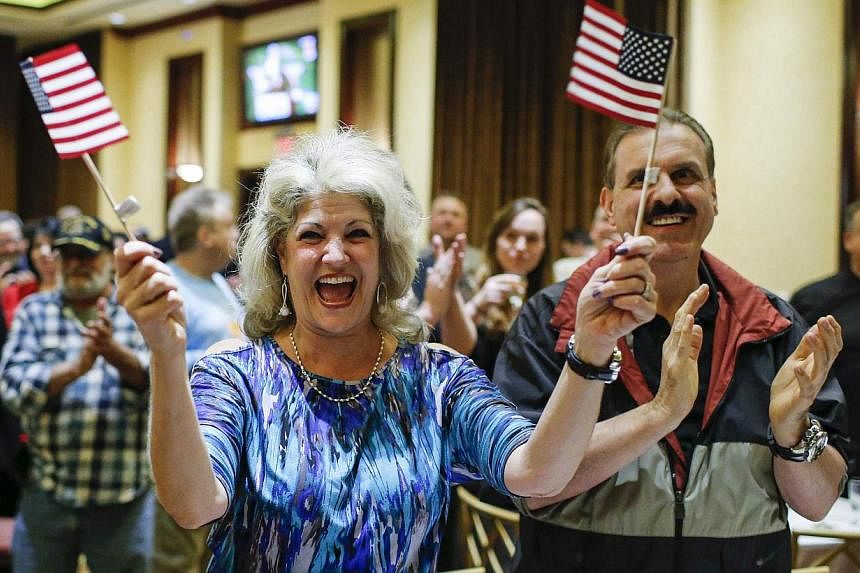1. New hope for free trade
The ambitious Pacific Rim free trade agreement known as the Trans Pacific Partnership (TPP) has faded from view in recent months as it became clear that the US would not be able to make any progress on the agreement until after the elections.
Now that pro-trade Republicans have a strong mandate in Congress, there will no doubt be renewed hopes that the TPP can regain steam.
Free trade is one of the few issues where the Republicans and President Barack Obama's interest align. If he makes foreign policy and free trade a top priority in his remaining two years, most experts expect that the two sides will be able to make a deal on trade.
An indication of how hard the president will push for free trade could come as soon as next week when he visits Beijing for the Asia Pacific Economic Cooperation Summit.
2. Is a Republican Congress good for the economy?
The US has thus far been a bright spot in the global economy. Even as much of Europe continues to struggle with mediocre growth and hangovers from the 2008 global financial crisis, unemployment in the US has come down and the country is posting stronger than expected GDP growth.
The question then is whether a Democratic President faced with a Republican Congress would hurt or help the US economy?
Much will depend on how the Republicans choose to wield their increased influence in Congress and also whether they can contain the Tea Party insurgents within their own party. If moderate pro-business Republicans can push through their agenda, it will be good news for businesses and the economy.
3. Foreign policy and Obama's narrative of weakness
President Barack Obama is widely expected to turn his attention to his foreign policy agenda now that a Republican Congress will spell the end to most if not all of his domestic agenda.
However, his ability to effectively conduct his foreign policy might be affected by the narrative of weak leadership that Mr Obama has been unable to shake. His handling of ISIS (Islamic State in Iraq and Syria), the Ebola outbreak and the crisis in Syria has all led to criticisms of him as a weak leader. A heavy loss by his party at the mid-terms has now simply added fuel to that fire.
A case in point, just days before the President is due to visit China, a paper with close ties to the Beijing government described him as a banal leader doing an "insipid job".
The President's wings have been clipped at home and that may well affect how assertive he can be on the world stage.
4. IMF quota reform becomes harder, problem continues
The US is the only major country yet to ratify the 2010 International Monetary Reforms (IMF) that provide for the organisation's operating budget. Until the quota reforms are ratified, the IMF is forced to rely on ad hoc loans to conduct its programmes, many of which are in developing countries in Asia.
Republicans have thus far been the main obstacle to Congress ratifying the reforms as many argue that the changes would hurt the US deficit while reducing the country's influence in the IMF. Experts say both arguments are unfounded.
IMF chief Christine Lagarde has said the Fund would wait until the end of the year before looking for alternatives. With a Republicans in complete control of Congress from next year, it becomes harder for the US to pass IMF reforms.
5. The road to 2016 begins
As one election campaign ends, another begins in the US - this time with global implications. While the midterm election results do not tend to have any predictive value for presidential elections, it does give some indication of what the field will be like and what sort of politics they will pursue in the next two years.
Most analyst say it now costs around US$1 billion (S$1.28 billion) for a candidate to win the presidency so anyone who wants to get into the race needs to get in early to have enough time to raise funds.
The big questions about the 2016 field are mainly on the Republican side. At the moment, Senators Marco Rubio, Rand Paul and Ted Cruz have all announced an intention to run.
In a Republican-controlled Congress, lawmakers with one eye on the presidency would be a disruptive force. Such lawmakers tend not to be team players as they seek to make themselves stand out from the rest. This could scupper some of the more pragmatic measures the Republican leadership wants to push through.
For the Democrats, former secretary of state Hillary Clinton still looks like the favourite for a nomination. A Clinton presidency is expected to be a good thing for the Asia rebalance as she was a key figure in the formation of the policy.


